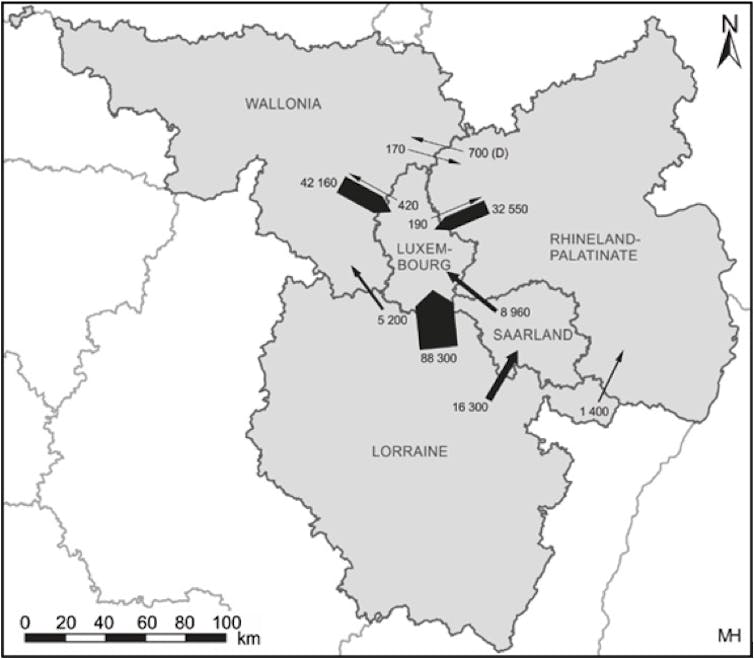Consumption: in the Grand Est region, the crisis has changed the habits of cross-border workers
A cross-border cooperation area in the heart of Europe, the Greater Region comprises several territorial entities belonging to four countries: Germany, Belgium, France, and Luxembourg. This large cross-border area is characterized by several major cross-border labor flows, with Luxembourg and Saarland as the main recipients and Lorraine as the main "supplier."
Béatrice Siadou-Martin, University of Montpellier; Colette Grandmontagne, University of Lorraine; Hélène Yildiz, University of Lorraine; Mathias Boquet, University of Lorraine; Nicolas Dorkel, University of Lorraine and Rachid Belkacem, University of Lorraine

These Belgian-French-German-Luxembourg borders are characterized by very large and growing flows of cross-border workers. Luxembourg alone attracts more than half of the cross-border workers in the Greater Region. The Luxembourg City metropolitan area is the top destination for cross-border workers residing in France, ahead of Geneva. In addition to French nationals working in the Grand Duchy, there are also Belgians and Germans. Cross-border workers thus account for nearly 44% of the Luxembourg workforce.

University of Luxembourg, mapping by M. Helfer
In mid-March, the temporary closure of borders and the introduction of border controls disrupted the daily lives of border residents, both in terms of employment and consumption, which also determines the reasons for travel: food, clothing, leisure, equipment, etc. In Luxembourg, for example, the widespread shift to teleworking made it painfully clear to various businesses how important these employees were to their turnover.
Relocalized consumption
Our survey conducted during the lockdown in March-April 2020 shows that, typically, 25% of households in the Grand Est region living less than 25 km from a border regularly shop abroad for essential goods, and 31% do so occasionally.
Among these households, while 14% and 32% report no impact or a low impact on their consumption, 35% and 18% of respondents report a moderate and strong impact, respectively.
The intensity of the impact is also linked to the distance from the border. Those who acknowledge having been strongly impacted live on average 7.6 km from the border, compared to 12.6 km for those who report not having been impacted.

Above all, teleworking, which became widespread and was widely adopted during the spring lockdown, led individuals to relocate their shopping to places closer to home, particularly when this was possible with sufficient local supply. The various forms of cross-border consumption have been impacted, as opportunistic purchases, as well as those linked to organized travel, have declined along with the flow of workers.
Between disruption and opportunity
Crossing the border for work inevitably leads these workers to make opportunistic purchases, which are characterized by their convenience. Marketing literature shows that consumers incorporate their purchases into their daily routines: buying bread on the way to or from work, taking advantage of a trip to the post office to visit a clothing store, etc.
Furthermore, while purchases of products taxed differently on either side of the border are driven by budget optimization, purchases driven by hedonistic considerations (clothing, leisure) or careful consideration (cars, household appliances) highlight criteria such as quality or complementarity of supply. Consumers do not hesitate to compare prices at outlets on either side of the border. And that's without taking into account the commercial shift caused by digitalization...
Between disruption and opportunity, from a commercial perspective, the border has thus far provided fertile ground for the deployment of various consumer strategies. Businesses' location strategies were based on traffic flow criteria and not just on population density in the catchment area. But if the trend toward local consumption takes hold as a result of the crisis, this function could partially disappear.![]()
Béatrice Siadou-Martin, Professor of Management Sciences, University of Montpellier; Colette Grandmontagne, Senior Lecturer, University of Lorraine; Hélène Yildiz, Senior Lecturer in Management Sciences, University of Lorraine; Mathias Boquet, Associate Professor, University of Lorraine; Nicolas Dorkel, Research Engineer in Spatial Analysis, University of Lorraine and Rachid Belkacem, Senior Lecturer in Sociology, University of Lorraine
This article is republished from The Conversation under a Creative Commons license. Readthe original article.